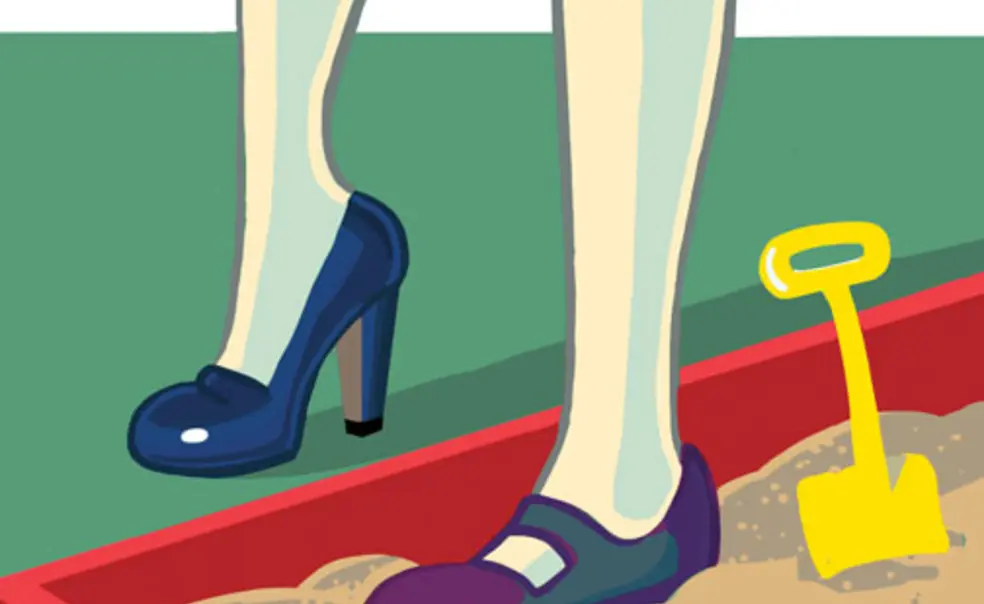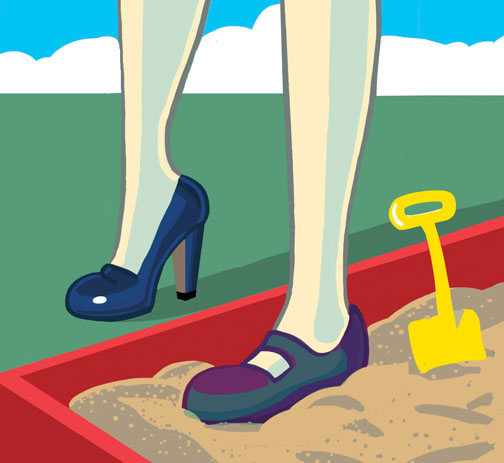When I was 26, and one year out of Harvard Business School, I attended a social event held by the school’s “network of alumnae.” It was a small group in someone’s home, and a classmate and I were, by 10 years, the youngest women there. At one point the women began talking about their struggles to balance their professional and home lives. I was married but childless, and the challenges they described seemed so distant as to be indistinct on the horizon.
Despite my inability to directly relate, the tone of the discussion bothered me. The women were negative, full of complaints about the ways in which they had to trade off one thing for another on a daily basis. One made a comment I’ve never forgotten, the gist of which was that everybody thinks you make some large, symbolic choice — once, showily and finally — between your children and your job. She said that it was, instead, a choice she made every single day in a thousand small ways.
For some reason I spoke up. At a break in the conversation I tentatively cleared my throat and asked, “Well, I don’t want to overstep here, and obviously I don’t have kids so I don’t know, but ... ,” I hesitated, “isn’t this kind of a great problem to have? Isn’t this a privilege, ultimately, to be choosing between a job you love and children you love?” I was roundly dismissed for not knowing how hard it was and for opening my mouth without any actual understanding of their plight.
And of course, we were both right; I know that now, after seven and a half years of trying to find the right balance between my two children and my professional life. I didn’t know then what I was talking about and probably ought not to have said what I did. Still, I believe to this day that having both a career and a family that you adore is one of the world’s great problems.
I haven’t ever had that job I love, though I have tried for many years to find it. To keep open the option for the day I do, I’ve been unwilling to give up on my professional life, though it has comprised jobs that never felt particularly challenging or rewarding. Neither have I been willing to give up the flexibility to spend time with my children, during the week, during the day. So I have spent these years trying to be a mother with a career who is also home with her children. I acknowledge that it is a great good fortune to have this choice at all, and that this is a dilemma of privilege.
After deciding in January to leave my part-time job at a private-equity firm where I managed recruiting, I began interviewing with executive search firms. The process triggered a landslide of self-doubt. I realized anew how little I feel I have accomplished in the decade since I graduated from business school. I have chosen a path of having a foot in both worlds (“career” and “home,” both in quotation marks because I think these definitions are simplistic), and as a result I have a home in neither.
What does it mean to have a foot in both worlds? I think it can be wonderful or it can be torment, depending on the person and the situation. I’ve always straddled the gulf of the mommy wars, always worked part time, always spent part of my week in an office building and part in the sandbox. I have insisted on keeping a “foot in the door” professionally because I was sure I’d want to “ramp back up” someday. These phrases, so familiar in business school, seem foreign on my tongue now, like a language I used to speak but have lost. The thing that haunts me is this: In being unwilling to give up either world, did I end up doing a poor job in both?
I decided when my daughter was born to scale back my professional aspirations and involvement in order to have more flexibility to be home. And still I ache about having missed the babyhoods of my daughter and son. I wonder if I would feel better about my children’s infancies had I chosen to be home full time — if I would feel I had inhabited more of those swollen, bittersweet moments that dot my days as a mother. It’s easy to blame that on the fact that I was at work some of the time, but when I’m honest I don’t think that is the reason at all. I think it’s about my wiring, my frantic restlessness, the way I struggle to be fully engaged in one thing at a time.
And yet I also feel frustrated by what feels like wasted years, spent only partially engaged in jobs that, in retrospect, did not mean very much to me. To keep the flexibility I prize so highly I have chosen roles that are often peripheral, not core to a company’s function, and I have been an individual contributor rather than a member of a team. This has eroded both my sense of making a real contribution and of feeling part of a cohesive group. What was the point of having missed hours with my babies for something that feels so insubstantial and inconsequential now? Of course, the dirty truth is that I didn’t really want to be there every single second.
People comment over and over again on how well I’ve figured out how to have a flexible, part-time career. And when people say that, I always smile and nod and express my satisfaction with my situation. But I haven’t figured anything out, and those comments always make ambivalence and regret roll into my heart like thunder. They remind me of all of the anxieties and misgivings I have about the trade-offs and choices I have made.
My friend Aidan has written about how she frets that she has wasted her education. I relate to this. I worry that I am letting down my parents, who made an enormous financial and emotional investment in my education. I worry that I am failing the teachers who took a particular interest in me, made me believe I was not stupid, helped open my mind. I don’t feel that I am letting down those people because of my specific choices, but because of who I am: because I am not more curious, ambitious, intelligent. I am certain that the fears of disappointing these role models are a big part of what spurred me to keep working all of these years. Yet can they really be proud of such incremental efforts, such minimal achievements in the professional world?














No responses yet